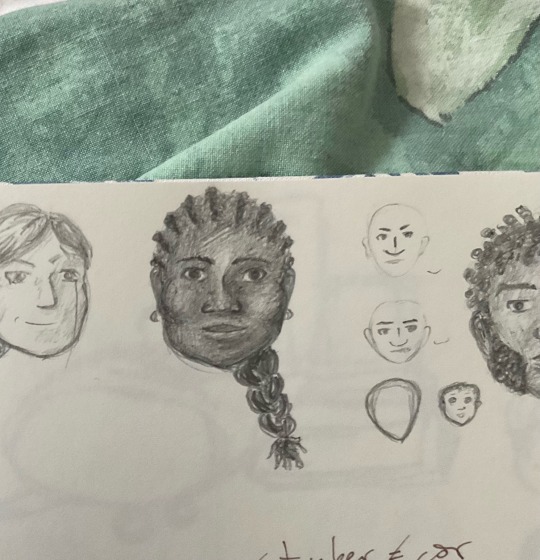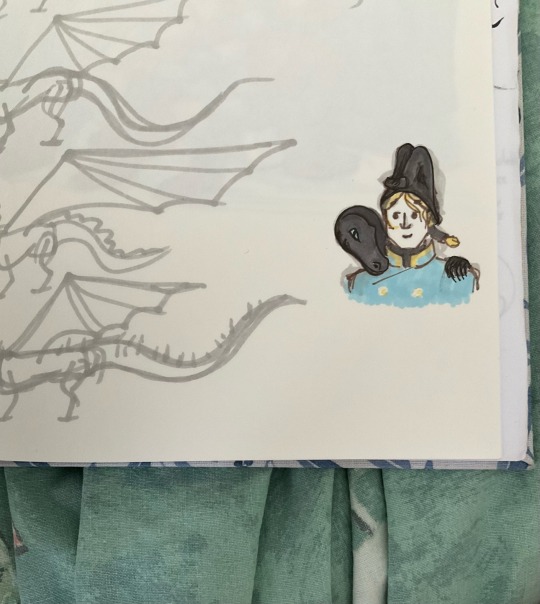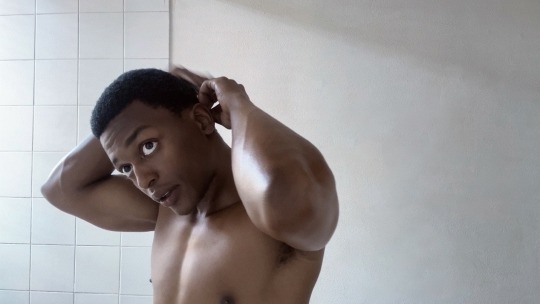#Lethabo
Explore tagged Tumblr posts
Note
if i may ask, have you made any ocs with ehlers danlos syndrome?
your art is always so wonderful to see when it crosses my dash, it makes me happy to see such colorful and honest art of disabled characters!! its a joy to see characters like me. the collei art you made made me so emotional! it was so wonderful to see a character i love drawn disabled like me <3
anyway, i hope you have a good day!! <3
Yes, I have!
Meet Lethabo!
He/They • Nonbinary • 21 Years Old
Hypermobile Ehlers Danlos • Autistic
His special interest is meteorology, and he travels from location to location because of it.




#my art#art#disabled artist#original characters#lethabo#thabo#ehlers danlos#hypermobile ehlers danlos#autistic#autism#two-shadows
191 notes
·
View notes
Text
Berkley butting in and telling two squabbling captains to settle their differences with their fists and have done is one of the many reasons why I love him so.
#Riley could stand to have his clock cleaned for treating Mrs Erasmus the way he did#but I’ll settle for the thorough admonishment he got for his effort#William Laurence#Tom Riley#Berkley#Temeraire#Lethabo#Empire of Ivory
7 notes
·
View notes
Text
0 notes
Text

Lethabo Huma
311 notes
·
View notes
Text
Lethabo Jasmin (@yo.its.bassie)
#Lethabo Jasmin#yo.its.bassie#south africa#africa#mzansi#beauty#black beauty#black girl magic#curvy#thick#vids
31 notes
·
View notes
Text

Shai Lethabo
#black girl aesthetic#black girls are beautiful#black women in luxury#black women#style#fashion#clothing#baggy jeans#flat belly#black supermodels#black goddess#black girl moodboard#black girls in luxury#black girl luxury#black girls of tumblr#black girl magic#black girl beauty#Shai Lethabo
57 notes
·
View notes
Text



Well
@_lethabo
@thicksexyasswomen46🔥🔥
6 notes
·
View notes
Text
The Negro Family: The Case for National Action (from here on referred to as The Report), known in popular vernacular as The Moynihan Report (1965), celebrated its fiftieth anniversary in 2015. In 1965, amidst a backdrop of Black urban rebellion, Moynihan’s anxiety about the crumbling fabric of the negro family headed by the Black matriarch inspired his characterization of the black family as a “tangle of pathology.” Alongside the sociologist’s attempts to police and surveil unruly Black urban life through producing the ‘Black family’ as an object of knowledge and problem for national security, Moynihan also reaffirmed the family as the singular epistemic mode of knowing and regulating the self and American (or US) civil society. Moynihan affirmed for the United States that, “The family is the basic social unit of American life.”
Since The Report’s publication, Black scholars and activists have felt compelled to respond to The Report and its legacy that has marked Black single mothers, Black genders, sexualities and family formations as self (and nationally) destructive. Since its introduction into mainstream public discourse in 1965 the Black Matriarch has embedded itself in the US imaginary in an almost archetypal fashion. In fact it has become the primary discourse used to both imagine and speak about the ‘Black family’ specifically as a problem and thus an object of disquiet. Black academic ‘feminists’ and Black women activists have critiqued both Daniel Patrick Moynihan’s and Black bourgeois attempts to castigate Black female headed households as perverse and deviant. Black feminists have labored to illumine the ways that the “controlling image” of the Black matriarch forecloses upon the possibility of imagining viable non-nuclear family formations, vilifies Black single female sexual autonomy, reinforces an ethos of personal responsibility and disavows structural inequality making it almost impossible to imagine a politics of redistribution. To date, Black feminist and queer scholarship continues to propose Black matriarchal, non-heteropatriarchal and queer models of affirming Black family life in an attempt to counter the legacy of pathologization left by The Report.
However, after fifty years of ever-evolving and increasingly nuanced Black feminist responses to The Report, rarely do critiques and alternative modes of the Black filial interrogate the viability of the notion of the family itself. While, Black feminist responses to The Report and the discourse of Black matriarchy have argued for alternative forms of family, ranging from intergenerational, extended, non-sanguial, and queer; the family as a sociological unit and as a self evident and natural form of human organization persists. Even when Black and Black queer feminists call for alternatives to the the ‘normal family,’ these modifications and revisions to the family still retain attachments to the liberal humanistic concept of the filial as the organizing frame for legible Black collective life.
Black ‘feminist’ abolitionist responses that trouble the very concept of the family as a way of organizing Black life still remain unexamined and perhaps even “unthought.” In this essay, I argue that while most Black feminist and queer modes of critique exhibit a suspicion or ambivalence toward the family, the responses of Kay Lindsey (1970) and Hortense Spillers (1987) offer a distinctly abolitionist critique of the family. Unlike “suspicious” or reformist critiques, which tend to hold onto at least some aspects of the normative and liberal family model, the abolitionist frame organizing this essay opens up the possibility of naming and doing Black relations outside of the categories that currently name humanness. This essay focuses on Black abolitionist critiques that denaturalize the family as a normative and humanizing institution to which people should aspire to belong. More importantly, it opens up conversations about alternative modes of naming the self in relation to others outside of the Western humanist tradition.
Because of the ongoing disruption of Black sociality and the understanding that Black relations are under assault, the ‘Black family’ has taken on an almost sacred significance within Black social life due to its heralded role as a protective mechanism to Black vulnerability and violation. The Black praxis of family as an everyday lived experience has the potential to ground people, provide material and emotional support and affirm the spirit of many Black people who feel vulnerable in the world. For many, including myself, family helps make life livable amidst everyday enactments of antiblack violence. To be clear, this essay does not indulge in a nihilistic destruction of the family for the sake of Afro-pessimistic intellectual experimentation. Rather, it is precisely because of this need for and commitment to Black sociality as a dynamic and inventive practice that this essay presses toward otherwise modes of thinking and being with one another. This essay conscientiously attends to the ways that the western notion of the family functions as a site of violence and dehumanization that threatens to engulf Black sociality. While Black feminist, queer scholarship and creative work have called for a reimagining of the Black family on radically different terms (non patriarchal, egalitarian and queer) they often do not critique the family in ways that draw attention to the violent ways that the family emerges as a category of violent forms of humanism. I consider the possible abolition of the family (and Black family) because I fear that the institution crowds out the dynamic and emerging ways that Black people reimagine and invent new modes of relation.
Tiffany Lethabo King from “Black 'Feminisms' and Pessimism: Abolishing Moynihan's Negro Family”
46 notes
·
View notes
Note
hey i love ur art. Wondering where you got the name Thabo from? Its common where i live but i never seen it anywhere else on the internet.
He’s South African, specifically Zulu. I do a lot of research when It comes to making my original characters, and no detail goes “untouched”.
His name means “Happiness/joy”, and I wanted him to be seen as a very joyful guy due to his special interest and personality.
He doesn’t live in South Africa currently, as he studies abroad and travels to different countries due to his passion of meteorology!
When it comes to naming my characters, I often will look into their culture specifically, think “what would their family name them”, or what their life may have been like, etc. A lot of my characters have names connecting / tying them to their culture because I think it’s a beautiful way to show their heritage, personality, and in general diversity.
27 notes
·
View notes
Text
I love that the younger ensigns of the corps named the dog after the lion from the tale of Hercules.
#Nemachaen is good dog#the best boy#Temeraire#Empire of Ivory#I’d like to think they went back for the dog#or at lease that Lethabo took him in
7 notes
·
View notes
Photo




Lethabo Molotsi
14 notes
·
View notes
Text

Daydream, by Lethabo Huma.
3 notes
·
View notes
Text




A collection of doodles - i don’t have them completely figured out yet
#the first page includes: edith galman. alice pemberton. lethabo(mrs erasmus). lady allendale. anahuarque. temeraire and tiny laurence#the initial description of anahuarque says she has a turban with feathers in it but i get the feeling it isnt supposed to look like this…#i imagine that edith no2 is saying ‘a dragon was not part of the deal!’#and alice no1 is thinking something like ‘i dont know what i expected. but it wasnt …this.’#i feel like the dragons are pretty generic still. except for iskierka who ended up kinda httyd-books-esque …which fits i think#i. also rather happy with temeraires very long smug smile#temeraire#my art#maybe i made lethabos cheekbones a bit too round in the more detailed sketch? …i just like that kind of bone structure a lot#im pretty proud of drawing that one on a moving train tho
5 notes
·
View notes




